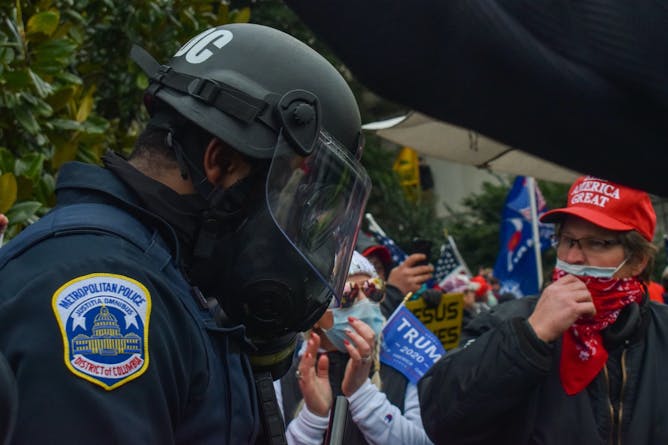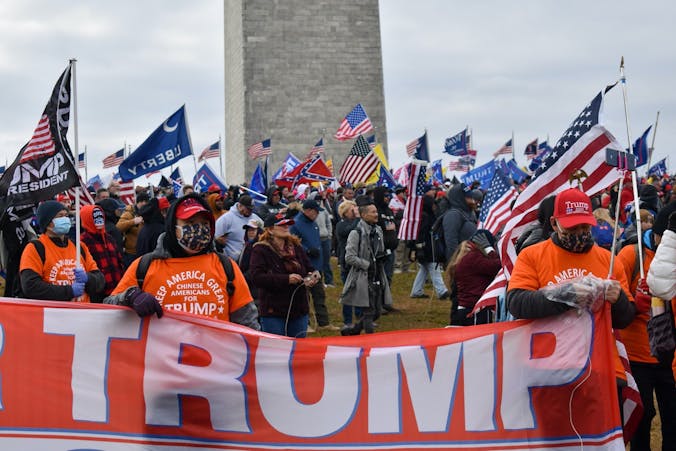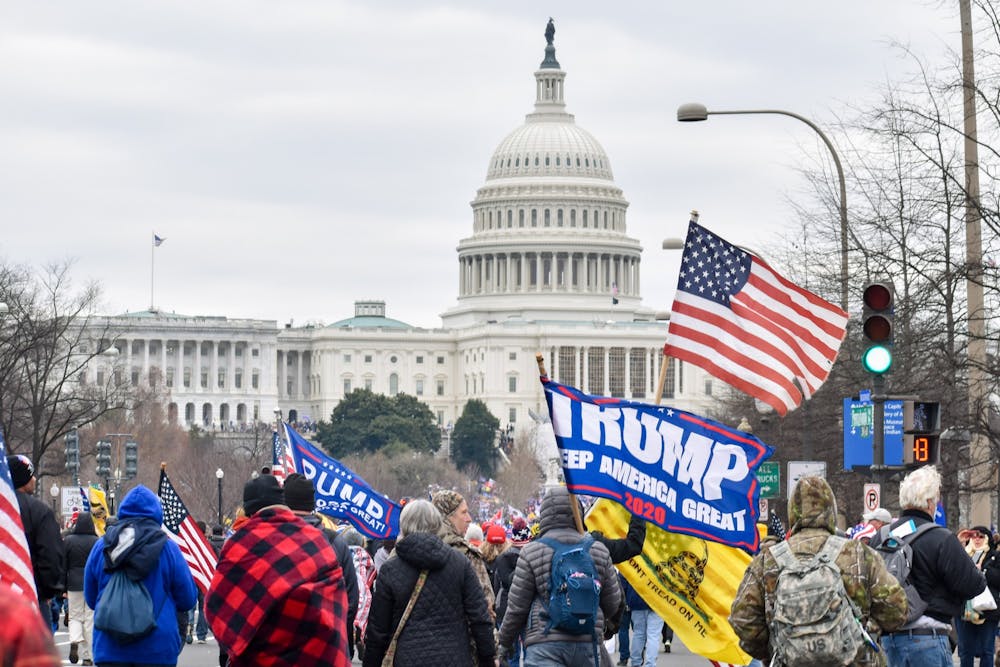As American University postdoctoral fellow Michael R. Fisher Jr. watched news coverage of the Capitol insurrection in horror on Jan. 6, he reached a painful conclusion: This is who we are as a nation.
The event was another instance in U.S. history where white supremacist rage, stoked by a political leader, erupted into violence, he said. Fisher, who teaches in the School of Public Affairs, said that anyone paying attention to President Donald Trump’s rhetoric could have seen it coming.
“We have to all recognize that we all have skin in the game,” Fisher said. “We’re all impacted by this, whether we are impacted directly because we’re part of a marginalized community, or we’re impacted because we’re connected to people who are part of those communities.”
The insurrection instilled or reinforced fear and anger within the AU community over the violent effects of far-right conspiracies and inflammatory rhetoric. Many called on Congress and the FBI to hold the politicians who supported Trump’s baseless election fraud claims and insurrectionists accountable, rather than moving quickly to calls for unity, which some Republicans have advocated.
Foremost among their conclusions: This wasn’t an isolated incident, the police response was disproportionate and unacceptable, especially compared to protests over the summer of 2020, and as a university, AU must learn from and push back against such extremism.
SPA associate professor Steven Taylor said that watching the news coverage of the insurrection as it happened scared him.
“I thought, ‘They’re gonna stop this vote,’ you know?” Taylor said. “I was worried that they had a lot of official support and that democracy had just died.”
“It is not the responsibility and the job of students of color to educate everyone else.”

Fanta Aw, AU’s vice president of campus life and inclusive excellence, said that for people of color, these fears of violence are not new. She encouraged those affected to reach out for support in whatever way they might need it, whether it be for mental health, community or religion.
“It is really incredibly important for all of us when these things happen to acknowledge it and to not pretend it is business as usual,” Aw said. “I would really urge faculty to, in their classrooms, find a way to integrate this within their classroom and to stop and to acknowledge it and to engage their students and understand where they’re at and what this really means for all of us. All too often, because it is so difficult and sometimes uncomfortable, we’re so afraid that we’re going to get it wrong and the best thing to do is brush over it.”
Aw asked that those trying to take care of their communities recognize that people handle pain differently based on their lived experiences. Sometimes, the best thing to do is just to give someone space if a person asks for it, she said.
“We need to remind ourselves that it is not the responsibility and the job of students of color to educate everyone else,” Aw said, echoing the sentiments activists repeated over the summer of 2020. “We have to take upon ourselves the initiative to educate ourselves and not put that burden on students of color or faculty or staff of color. The majority within our community has an even greater responsibility.”
Fisher agreed, and encouraged white students to seek out resources to learn about white supremacy in its many forms. Once they’ve done that, he said, “You might want to consider reaching out to people on the ground and asking how you can support these efforts.”
Black Lives Matter DC is a great place to start, Fisher said, but he encouraged students not to stop there.
“There’s a whole community in D.C. that is working to make D.C. a better place for all of its residents, centering those who are disenfranchised and face the biggest barriers to equality or equity,” Fisher said.
“The Capitol rioters were attempting to disrupt American democracy.”

AU’s student community concurred with Aw and Fisher, and contrasted the events to the wave of racial justice protests over the summer of 2020 in D.C. and other cities, many of which were met with an overwhelming police presence. On June 1, police arrested five times the number of protesters than they did on Jan. 6, CNN reported.
Jordan Davidson, a sophomore in SPA whose family lives near the Capitol, said that over time he became used to regular demonstrations in the area. The Jan. 6 events were “nothing like we had ever seen before,” he said. For a period, he was frightened that the rioters would pass through his neighborhood.
Although many did, his family remained safe.
“I went to several BLM protests in D.C. over the summer,” Davidson said. “BLM protesters were representing American democracy by legally protesting for change. The Capitol rioters were attempting to disrupt American democracy.”
Other students were directly impacted by the rioters’ presence in D.C., including SPA sophomore Sophie Macaluso, who works at Tatte, a bakery and cafe near Dupont Circle. Macaluso said many customers she saw on Jan. 6 wore MAGA merchandise. Many also refused to socially distance or wear masks, as required by D.C.’s mask mandate.
She said she was more frightened after Mayor Muriel Bowser’s 12-hour curfew went into effect at 6 p.m. on Jan. 6, as Macaluso saw Trump supporters continue to walk through the area.
Both AU College Democrats and AU College Republicans released statements condemning the insurrection. AUCR demanded Trump move to end the violence, calling the events “reprehensible, both morally and legally.”
AU Dems expressed support for freshman Rep. Cori Bush’s (D-Mo.) resolution to investigate and expel members of Congress who voted against confirming the election results. The group’s statement also called for the removal of Trump from office for his role in inciting the violence.
Edu Nogues, a sophomore in the School of International Service and speaker of the Undergraduate Senate, was with his family in Spain during the attacks at the Capitol.
“Many feared the imminent fall of American democracy, and thus, the decay of individual freedoms around the world,” Nogues said. “It seemed like the beginning of the end.”
AU Student Government President Eric Brock said the riots and ensuing police action were a painful reminder of institutionalized racism.
Brock said he couldn’t put into words how he felt about the riot and response given that there are “Black folks who have been murdered for far less.”
“People will think of this as a failed presidency … as long as democracy survives.”

As the spring semester begins, Fisher said AU instructors must call out the insurrection without ambiguity.
After President Barack Obama took office in 2009, many Americans “had the rose-colored glasses of colorblindness” to the ideas of race, Fisher said.
Now, Fisher said the public recognizes the need to talk explicitly about white supremacy and what it looks like, the ways the U.S. has failed to deal with white backlash of the civil rights movement, and how racist ideas perpetuate systemic inequality in the country. This undercurrent of rage led to disputed election results and outright lies, many surrounding the baseless questioning of results from majority-Black districts in the November presidential election, he said.
Amy Eisman, the director of the School of Communication’s journalism division, said she recognizes how hard this moment is for students. She plans to make discussions of racial inequality and disparity “front and center” during the spring semester.
There are things journalists have missed, she said, including the depth and severity of the divide in American politics. It’s an incredible time to have a front-row seat to history, but that doesn’t make it easy.
“One of the changes in journalism is to back off from false equivalency,” Eisman said. “You’re not going to hear people say, ‘Go get me the other side.’ You’re going to see people say, ‘Get me the full story.’
Ron Elving, a professor in SPA’s department of government, hoped the riots would lead to more people altering their assessment of harmful political discourse, rather than dismissing extremist ideology and rumblings as non-threatening.
“I hope this will make people realize that voting is not just a chore or obligation like paying your taxes,” Elving said. “It’s our shared responsibility to make this country work for 330 million-some-odd people. It’s not something someone else does for us.”
For Taylor, even entertaining the thought of something similar happening again is painful, and not something he wants to think about, let alone speak of.
“Has the American public become so angry and resentful that such events can become normal?” he said. “There’s a good chance that in 20 years, I won’t be around, but you probably will be. I have a feeling that in the future, people will think of this as a failed presidency and an example of buffoonery, dangerous buffoonery … as long as democracy survives.”





